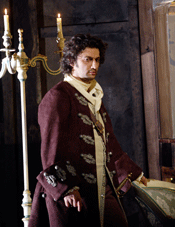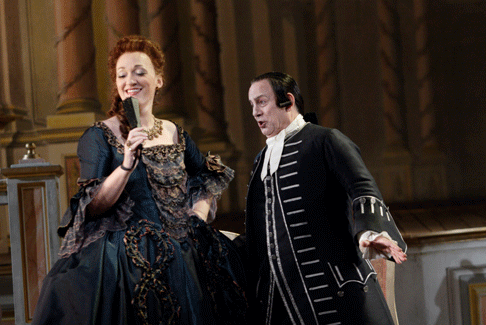Despite
Adriana Lecouvreur being something of a rarity in the UK, having been
absent from the stage of Covent Garden for more than a century, the prospect of
Angela Gheorghiu taking on the title role for the first time was more than
enough to justify the risk — though it is perhaps a sign of the times
that it is a co-production with four other international houses, the largest
number of collaborators I can ever recall seeing in an opera programme.
If I were producing an opera about theatre and actors, David McVicar is
precisely who I would engage to direct it, given his knack for injecting
opulent theatricality into the most naturalistic of dramatic situations. And if
nobody had told me that this was one of his, it wouldn’t have been
difficult to guess. The hallmarks were all there — the vast crowd of
supernumeraries, the stage clutter, and Brigitte Reiffenstuel’s
deconstructed-Baroque dance costumes to name but a few — but this time
McVicar has gone one step, if not many steps further in the name of making a
point about the nature of theatre and artifice.
 Jonas Kaufmann as Maurizio
Jonas Kaufmann as Maurizio
It was heaven for a geek like me, thanks to the sheer number of references
to other shows — maybe a natural progression from the score itself. Cilea
was a contemporary of Puccini and Massenet, and most of the aural reminders are
from this milieu, but Act 4 in particular evokes a wider range of influences.
In McVicar’s staging, a balletomane friend of mine who attended the dress
rehearsal picked up on direct references (costumes and choreographic devices)
within the Act 3 ballet to Royal Ballet productions of La fille mal
gardée, Invitus Invitam and Sylvia. The chorus crowded
into their onstage audience-seating much as they did in McVicar’s
Alcina for ENO in 1999; then, a marble bust of Handel dominated the
stage; here the bust was Moliere’s. It was interesting that of all his
own works, this was the one McVicar chose to reference; another opera about the
blurred boundary between theatre and reality.
With Charles Edwards’s set dominated by a large box which for much of
the opera served as a full-height, fully-formed stage-within-a-stage, the
production seemed determined to underline that we were the audience, and what
was happening before us was not reality. The mostly naturalistic scenery was
garnished with little touches of artificiality; vividly ornate interiors, for
example, were finished off not with heavy velvet draperies, but with curtains
painted onto wooden flats. Even Act 2, whose stage directions contain no overt
references to a theatrical setting, appeared to be taking place on a stage,
with the men in particular giving a stylised feel to their entrances and exits.
Only in Act 4 was this extra level of artifice dispensed with; though the
spectre of the stage continued to loom large over Adriana, it was a bare shell,
and suddenly (the ludicrous business of the poisoned violets notwithstanding)
it was all a lot more immediate and credible.
So what of the much-hyped cast? Gheorghiu may not be an immediately obvious
‘humble handmaid of art’ but she was poised and charming, playing a
very youthful version of this heroine who historically has been associated with
the ageing diva. Her voice is very much on the small side given the scoring,
and for the intimacy of the first and last acts (which frame Adriana’s
two celebrated arias) it was often exquisite. But in the confrontation with the
Princesse de Bouillon and again in her vengeful Phèdre monologue, Gheorghiu was
a kitten when a tigress was needed. I can’t quite picture how she will
hold her own when the role of the Princesse transfers to the mighty Olga
Borodina later in the run.
Jonas Kaufmann always seemed on the edge of something spectacular, and the
contained restraint with which he treats his large, dark-coloured voice would
have been massively exciting had it been part of a broad palette. As it was, he
seemed to be trying to demonstrate that a hot-blooded verismo hero can be sung
with subtlety and intelligence, while also showing off some of his remarkable
technical skill (particularly in his legato, and once, memorably, his
impeccable ability to diminuendo on a top note). It was very, very impressive
— but all too careful, too measured. It seemed a studied effort in
avoiding stereotype (or perhaps he was reining himself in to avoid overpowering
Gheorghiu) but I longed for him to let rip.
 - Michaela Schuster as Princesse De Bouillon and Bonaventura Bottone as Abbé De Chazeuil
- Michaela Schuster as Princesse De Bouillon and Bonaventura Bottone as Abbé De Chazeuil
Michaela Schuster was a dramatically-committed if somewhat vocally
undisciplined Princesse, though it was a misjudgement (probably the
director’s) to have her exchange with Adriana in Act 3 played partly for
laughs, which diminished the impact. Alone among the major principals,
Alessandro Corbelli — as Adriana’s unrequited admirer, Michonnet
— was alone in painting a full and touching character portrait.
Much of the interest, and there was plenty, came from the supporting
characters. Janis Kelly (Mlle. Jouvenot) and Sarah Castle (Mlle. Dangeville)
sparked off one another in Act 1 in an impeccably-judged battle of wills;
Bonaventura Bottone (the Abbé de Chazueil) and Maurizio Muraro (the Prince de
Bouillon) gave nicely-detailed character portraits in a production which made
them quite stylised and more than a little camp.
Mark Elder’s conducting displayed many of the same characteristics as
Kaufmann’s singing — lovely, delicate, but for this repertoire far
too careful and finely-crafted. On opening night the Gheorghiu and Kaufmann
fans were out in force, with every aria met with cheers. But for me, a bit less
decorum and a lot more scenery-chewing, both on stage and in the pit, would
have served the opera better, and improved a promising performance in a
lovingly-crafted production immeasurably.
Ruth Elleson © 2010
![Angela Gheorghiu as Adriana Lecouvreur [Photo by Catherine Ashmore courtesy of The Royal Opera]](http://www.operatoday.com/ADRIANA-2442-0317-GHEORGHIU.gif)

